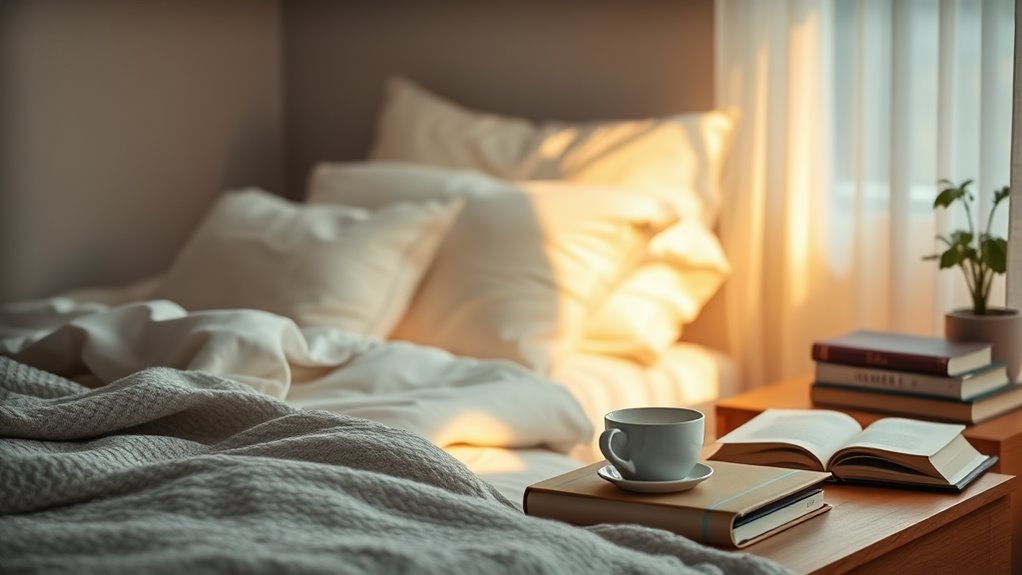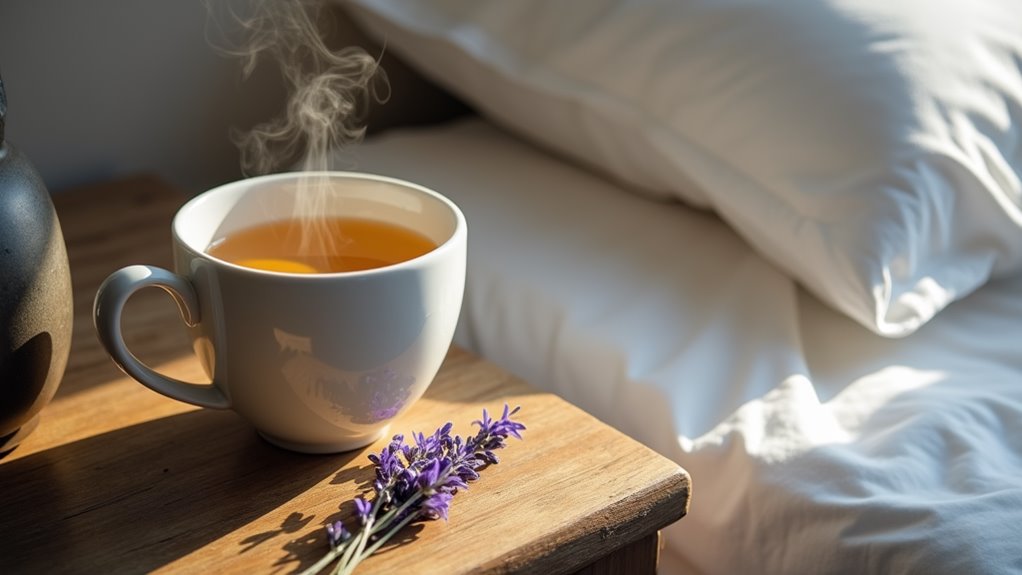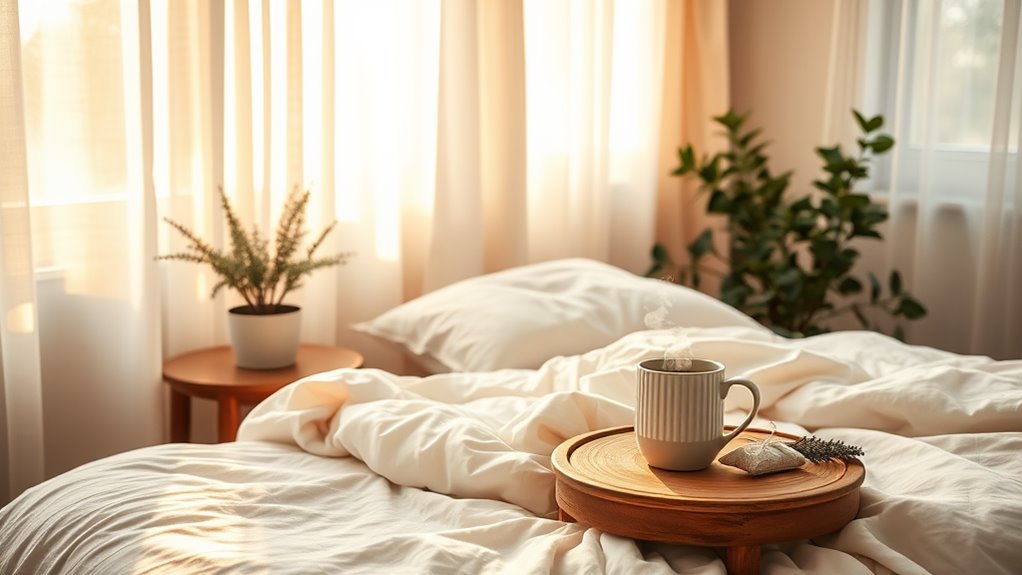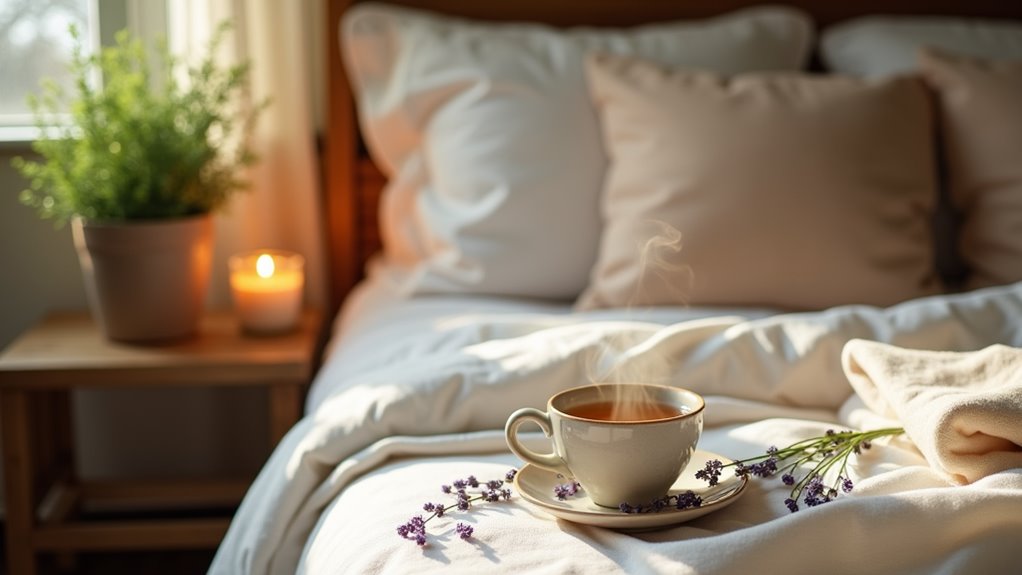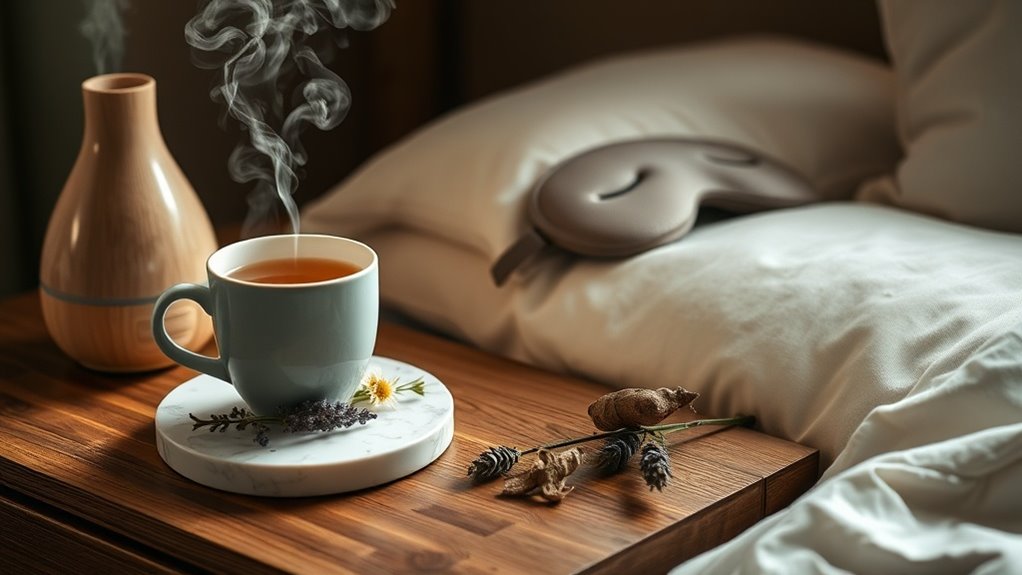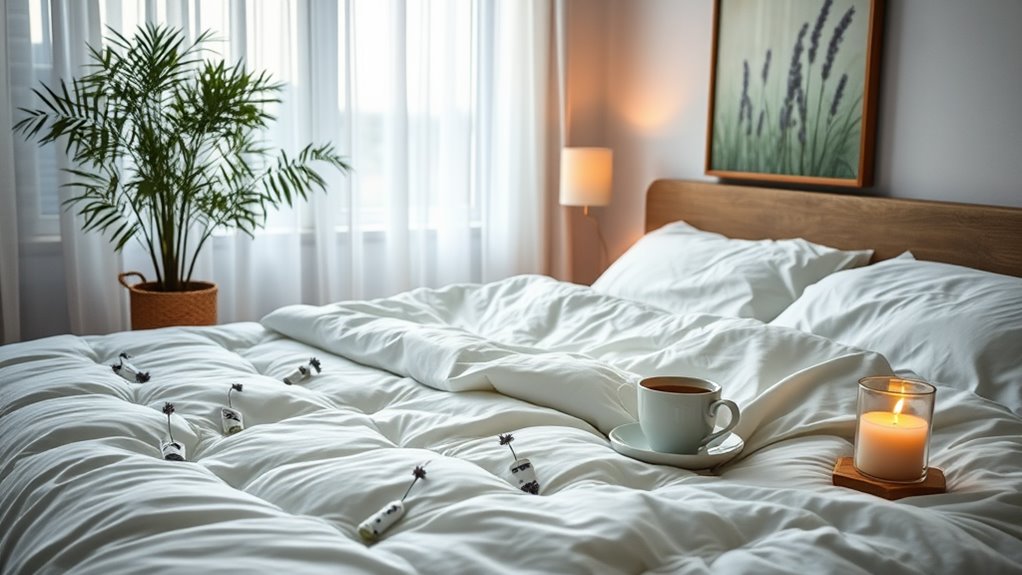My Bedtime Routine That Supports a Better Night’s Sleep
To support a better night’s sleep, establish a consistent bedtime routine. Incorporate calming activities like deep breathing, gentle stretches, or journaling to help you unwind. Create a sleep-friendly environment by dimming the lights and ensuring a comfortable temperature. Natural remedies like chamomile tea or lavender oil can enhance relaxation. Stay adaptable, adjusting your routine as needed while maintaining core elements. You’ll likely observe improvements in your sleep quality, and there’s more you can do to enhance this process.
The Importance of a Consistent Bedtime Routine
When you establish a consistent bedtime routine, you’re not just promoting better sleep; you’re also enhancing your overall well-being. This routine helps you maintain a regular sleep schedule, which significantly improves sleep quality and duration. Consistency in your bedtime is even more crucial than the amount of sleep you get. Using natural sleep remedies, like herbal teas or calming scents, can further enhance this experience. Children benefit as well; regular routines foster emotional regulation, improve cognitive skills, and boost academic performance. Research shows that consistent bedtimes lead to better emotional and behavioral outcomes in children, and incorporating mindful breathing techniques can also complement this routine by reducing stress levels.
Calming Activities to Wind Down
How can you create a tranquil environment that signals your body it’s time to wind down?
Start with calming activities that help you relax and transition to sleep.
Consider incorporating these practices into your nightly routine:
- Deep breathing to calm your mind and body
- Gentle stretches to release physical tension
- Journaling to clear your thoughts before bed
- Listening to soothing music that promotes relaxation
Engaging in deep breathing exercises can activate the parasympathetic nervous system, further enhancing your ability to unwind and prepare for a restful night. Embracing these activities can significantly improve your ability to unwind and prepare for a restful night. Engaging in these calming practices leads to better sleep quality, allowing you to feel refreshed and ready for the next day.
Creating a Sleep-Friendly Environment
To create a sleep-friendly environment, start by controlling the lighting in your bedroom; dim lighting helps signal to your brain that it’s time to sleep. Additionally, ensure that your bedroom is very dark by using room-darkening shades to block any incoming light. Next, invest in comfortable bedding that supports restful sleep and maintains a pleasant temperature throughout the night, as natural remedies work with body rhythms to promote better sleep quality. Finally, reduce noise levels using techniques like soundproofing or white noise machines to foster a calm and relaxing atmosphere.
Dim Lighting Effects
Creating a sleep-friendly environment hinges significantly on the lighting you choose for your bedroom. Dim lighting can disrupt your sleep architecture, leading to issues like:
- Increased nighttime awakenings, leaving you groggy.
- Reduced deep sleep, meaning less restorative rest.
- Delayed melatonin release, which pushes back your bedtime.
- Lower overall sleep efficiency, causing daytime fatigue.
To enhance your sleep quality, consider using blackout curtains, low-wattage lamps, dim nightlights for trips, and eliminating electronic devices. Exposure to dim artificial light at night can have adverse effects on sleep quality, increasing the frequency of awakenings and reducing deep sleep.
These adjustments help create a more peaceful and conducive atmosphere for falling asleep and staying asleep throughout the night.
Prioritize your bedroom’s lighting for better sleep!
Comfortable Bedding Choices
Comfortable bedding choices are essential for a successful sleep routine, impacting everything from your body’s relaxation to its temperature regulation.
Opt for breathable fabrics like cotton, linen, or bamboo; these natural materials promote air circulation and help maintain a comfortable temperature. Quality bedding supports deeper REM sleep stages, benefiting memory and mental health.
High-quality options like percale cotton offer a crisp feel, while sateen provides a smooth texture for added comfort.
Avoid synthetic fabrics like polyester, which can trap heat and disrupt sleep.
Choose bedding that aligns with your personal comfort preferences and sleeping style to ensure pressure relief and support, ultimately enhancing your overall sleep experience.
Noise Reduction Techniques
While comfortable bedding choices set the stage for restful sleep, the environment around you plays a vital role in achieving that deep slumber.
Implementing noise reduction techniques can significantly enhance your sleep quality:
- Use earplugs or noise-blocking headphones to keep disruptive sounds at bay.
- Install a white noise machine or fan to create soothing, consistent background sounds.
- Add acoustic panels or noise-blocking curtains to absorb external noise.
- Upgrade to solid-core doors and seal gaps to minimize sound intrusion.
Natural Sleep Remedies I Incorporate
When it comes to enhancing sleep quality, I’ve found that incorporating natural sleep remedies can make a significant difference.
I often enjoy chamomile tea before bed for its calming effects, while magnesium-rich foods, like leafy greens and nuts, support muscle relaxation. Tart cherry juice serves as a natural melatonin source, helping regulate my sleep-wake cycle.
Additionally, I use lavender essential oil in a diffuser to create a soothing atmosphere.
For deeper relaxation, sometimes I take valerian root supplements, ensuring they’re part of a balanced approach. These remedies align with the idea of working with the body’s natural sleep mechanisms, which enhances restorative sleep.
These simple remedies have greatly improved my nightly rest and overall well-being.
The Role of Adaptability in My Routine
How do you ensure that your bedtime routine remains effective as your children grow?
Embracing adaptability is key.
As your child’s needs shift, adjust your routine to maintain consistency while promoting calm.
- Incorporate age-appropriate activities that resonate with them.
- Make room for flexibility to ease transitions.
- Keep core elements like bedtime stable for reassurance.
- Engage the whole family for a unified approach.
This adaptability not only supports your child’s development but also enhances family bonding, ensuring a nurturing environment for restful nights. Additionally, integrating soothing drinks like honey-lemon tea can further promote relaxation and ease coughing before bedtime.
Observing Improvements in Sleep Quality
As you implement your bedtime routine, you may start to notice increased sleep duration and fewer nighttime awakenings.
These improvements are key indicators of better sleep quality, which can significantly enhance your overall well-being. Additionally, practicing 4-7-8 breathing can further assist in promoting relaxation and reducing anxiety before sleep.
Sleep Duration Increases
What factors contribute to the observed increases in sleep duration and subsequent improvements in sleep quality?
Many variables play a role, including personal habits and societal influences.
To enhance your sleep duration, consider these:
- Reduce screen time before bed to minimize disruptions.
- Create a calming evening routine to signal your body it’s time to sleep.
- Manage stress through relaxation techniques or mindfulness.
- Reevaluate weekend sleep patterns to balance out weekday deficits.
Fewer Nighttime Awakenings
Have you ever noticed how fewer nighttime awakenings can significantly enhance your overall sleep quality?
Reducing these disruptions can lead to feeling more refreshed in the morning.
If you wake up frequently—especially with trouble falling back asleep—it can negatively impact your mood and cognitive function.
Establishing a consistent bedtime routine, minimizing stimulants, and creating a calming environment can help.
Avoiding screens before bed and engaging in stress-relief activities can further decrease nighttime awakenings.

